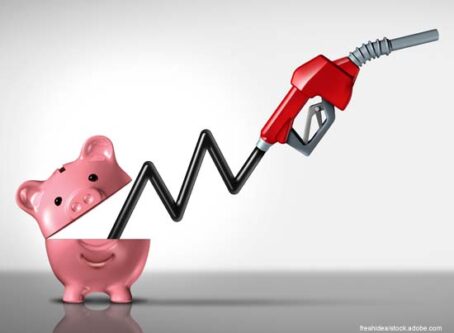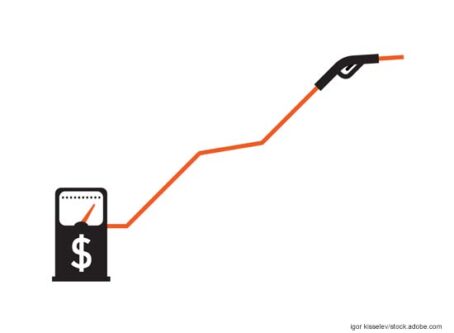Infrastructure stakeholders push for fuel tax increase during Congressional hearing
Five stakeholders provided testimony to the House Transportation and Infrastructure Committee on long-term highway funding on Wednesday. Despite the diversity of the witness panel, they all agreed on one obvious solution to replenish the Highway Trust Fund: increasing the federal fuel tax.
During opening statements, Rep. Sam Graves, R-Mo., said as early as the spring of 2020 states may have to halt construction of transportation projects since the Highway Trust Fund will dry up. The following witnesses offered their solutions to the problem:
- Chris Spear, American Trucking Associations president and CEO;
- John Schroer, commissioner of the Tennessee Department of Transportation, on behalf of the American Association of State Highway and Transportation Officials;
- Michael Lewis, executive director of the Colorado Department of Transportation, on behalf of the Western Road Use Charge Consortium;
- Ed Mortimer, executive director of transportation and infrastructure for the U.S. Chamber of Commerce; and
- Thea Lee, president of the Economic Policy Institute.
It was clear that lawmakers were getting fed up with the back-and-forth discussions and hearings. Ranking member Eleanor Holmes Norton, D-D.C., referenced Transportation Secretary Elaine Chao’s go-to phrase when expressing her frustration.
“Saying the tabloid words ‘All options are on the table’ – what are they?” Norton said.
Rep. Peter DeFazio, D-Ore., was also fed up, noting that in January 2017 the committee held a similar infrastructure funding hearing. Thirteen months later, they are talking about the same thing.
“It’s time to stop talking and do something,” DeFazio said. “This is getting absolutely absurd.”
Fuel tax increase
Although the aim of the two-hour hearing was to find solutions for funding, the bulk of the time was spent by all five panelists rallying for an increase in the federal fuel tax.
In his written testimony, Spear proposed ATA’s solution titled the Build America Fund. The crux of BAF’s agenda is a 20-cent per gallon fuel tax to be phased in over four years. BAF’s fuel “fee” would be indexed to both inflation and improvements in fuel efficiency, with a 5 percent annual cap, generating nearly $340 billion over the first 10 years. Passenger vehicle drivers would see an increase of $100 per year in fuel costs.
“The fuel user fee is the most immediate, cost-efficient and conservative mechanism currently available for funding surface transportation projects and programs,” Spear said. “Collection costs are less than one percent of revenue.”
BAF will collect fuel taxes at the wholesale rack, which includes ports, terminals and pipelines. Spear said terminal racks are run by only 170 owners, and placing the fuel tax there will essentially bake the fee into the price of fuel.
Schroer’s testimony laid out three revenue options, the first of which is raising existing federal taxes and fees such as fuel taxes, user fees on heavy vehicles and sales taxes on trucks, trailers and truck tires. Schroer pointed out that the Highway Trust Fund derives about 90 percent of its revenues from taxes on motor fuels. He also said that since the federal gas tax was last increased, college tuition has gone up 379 percent, healthcare has increased 180 percent, houses are 180 percent more expensive, and even the price of movie ticket is twice as much as it was in 1993. However, the fuel tax remains the same.
Lewis acknowledged that all states are staring face-to-face with the same dilemma: transportation funding.
“This dilemma is driven by one simple fact: the gas tax as we know it is dying,” Lewis said.
Representing the Chamber of Commerce, Mortimer reminded committee members of the Chamber’s recommendation in January to increase the federal fuel user fee by 25 cents over the next five years.
“There is no free lunch, or road, or bridge,” Lee said. “American households will, in the end, pay for improved infrastructure, either through higher taxes or through user fees and tolls.”
Lee would later explain why tolls are a bad idea.
Some committee members still had reservations on a fuel tax increase. Rep. Don Young, R-Alaska, was worried about electric trucks. Spear explained that a Department of Motor Vehicle registration fee could be a possible solution. However, Spear was not convinced that electric vehicles are a problem, arguing the number of electric vehicles is very small. While acknowledging that number will grow, Spear does not think they will come into play for another 10 to 15 years.
Although the majority of committee members seemed to be open-minded about a fuel tax increase, other lawmakers appear more hesitant. Nearly every committee member who addressed the politics of a fuel tax pointed out that all the evidence shows that not only does a fuel tax increase work, but that there are also no political consequences for implementing an increase.
Norton pointed out that 24 states, including conservative states, have increased their fuel tax in the past several years. Chairman Bill Shuster, R-Pa., said the Highway Trust Fund will run out just before the 2020 election. Shuster followed that up by saying that of the 31 states that have raised substantial transportation revenue, including the 24 states with fuel tax increases, no one has lost an election as a result.
Despite the desperate calls for a fuel tax increase by stakeholders and committee members, high ranking members in Congress are still not convinced.
House Speaker Paul Ryan, R-Wis., told Americans for Prosperity on Wednesday that a fuel tax increase is not going to happen, according to several sources. Americans for Prosperity is political group funded by the Koch brothers. The group has been very vocal about its opposition to a fuel tax increase.
“We’re not going to raise gas taxes, so I don’t foresee that as a problem,” Ryan told the group. “We’re just not going to do that here. There are some people who are talking about that, but the last thing we want to do is pass historic tax relief in December and then undo that, so we are not going to raise gas taxes.”
Vehicle miles traveled tax
Another popular topic was a possible vehicle miles traveled tax, something that several states in the West have studied. Rep. Graves was particularly interested in this after stating fuel taxes and other user fees bring in less money, partly due to improvements in fuel economy standards.
Lewis, whose state of Colorado conducted a vehicle miles traveled tax pilot program, believes that a vehicle miles traveled fee should replace fuel taxes, predicting increased popularity and prevalence of electric vehicles.
“We anticipate this as a replacement for the fuel taxes that are currently the main source of funding four our roads,” Lewis said.
However, even Lewis acknowledged that the U.S. is years away from a vehicle miles traveled tax to be implemented. When Norton asked if a VMT tax is the answer, Lewis said that “we are not there today,” but possibly around 2025.
DeFazio had concerns about vehicle miles traveled fees, including unfair costs to rural motorists. More specifically, DeFazio wants to see congested pricing for VMT taxes, suggesting rural mileage should not cost the same as congested highway mileage in densely populated areas.
Rep. Rodney Davis, R-Ill., explicitly said he is not a fan of vehicle miles traveled fees. Davis said it disproportionately affects rural residents who typically drive farther to their jobs. As an example, Davis a said a rural, single mother driving 30 miles to work will pay higher vehicle miles traveled fees than more well-to-do workers in metropolitan areas who live closer to work.
Tolls
Tolls appeared to be the least popular funding option during the hearing. Norton pointed out that a special committee has studied public-private partnerships (P3s), and the results were clear.
“I believe that all those that served on that special committee will agree that P3s are perhaps best seen as a rather expensive scheme to borrow private money,” Norton said.
Norton cited a recent poll that reveals only 22 percent of Americans are in favor of putting tolls on interstate highways, with 65 percent opposed.
ATA echoed that disapproval.
“We will oppose expansion of interstate highway tolling authority,” Spear said. “Interstate tolls are a highly inefficient method of funding highways. Tolling also forces traffic onto secondary roads, which are weaker and less safe.”









